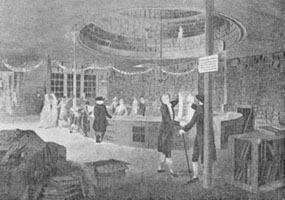
One of the World's Leading
Sources of Information On Books, Literature, and a Wide Range of
Subjects
Finsbury
(Note: This is taken from W. Roberts' The Book-Hunter in London.)
When Moorfields became improved into Finsbury Circus, the bookselling element was by no means extinguished. James Lackington (1746 to 1816), who had established himself as a bookseller in Chiswell Street, was issuing catalogues from that address from 1779 to 1793. He first started selling books on Midsummer Day, 1774, in Featherstone Street, St. Luke's. It was from Chiswell Street that Lackington dated those rambling letters which he styles 'Memoirs of the Forty-five First Years' of his life. In twelve years he had progressed so rapidly, from the sack of old rubbish for which he paid a guinea and with which he began business as a bookseller, that a move to more commodious premises became necessary. In 1794 he transferred his stock to one of the corners of Finsbury Square—which had been then built about five years—and started his 'Temple of the Muses.' The original building was burnt down some years ago, but the late Charles Knight has left on record an interesting sketch of the place as it struck him in 1801: 'Over the principal entrance is inscribed, "Cheapest Booksellers in the World." It is the famous shop of Lackington, Allen and Co., "where above half a million of volumes are constantly on sale." We enter the vast area, whose dimensions are to be measured by the assertion that a coach and six might be driven round it. In the centre is an enormous circular counter, within which stand the dispensers of knowledge, ready to wait upon the county clergyman, in his wig and shovel hat; upon the fine ladies, in feathers and trains; or upon the bookseller's collector, with his dirty bag. If there is any chaffering about the cost of a work, the shopman points to the following inscription: "The lowest price is marked on every book, and no abatement made on any article." We ascend a broad staircase, which leads to "The Lounging Rooms" and to the first of a series of circular galleries, lighted from the lantern of the dome, which also lights the ground-floor. Hundreds, even thousands, of volumes are displayed on the shelves running round their walls. As we mount higher and higher, we find commoner books in shabbier bindings; but there is still the same order preserved, each book being numbered according to a printed catalogue. . . . The formation of such an establishment as this assumes a remarkable power of organization, as well as a large command of capital.'
Six years after he had started, Lackington, who had been joined by his friend, John Denis—a man of some capital—published his first catalogue (1779), the title of the firm being Lackington and Co., and the list enumerating some 12,000 volumes. Denis appears to have been a genuine book-collector and a man of some taste, with the very natural result that they soon parted company. Lackington was as vain and officious a charlatan as ever stepped in shoe-leather—a trade to which he had been brought up, by the way—but that he had organizing abilities of a very uncommon order there can be no question. He found the catalogue business a great success, and in due course issued one of 820 pages, with entries of nearly 30,000 volumes and sets of books, all classified under subjects as well as sizes. For thirteen years (after 1763) Lackington did all his own cataloguing. In 1798 the Temple of the Muses was made over to George Lackington, Allen and Co. The former was a third cousin of the founder of the firm, and is described by John Nichols as 'well educated and gentlemanly.'
When he retired from the business, Lackington enjoyed himself to the top of his bent, travelling all over the kingdom in his state coach and scribbling. His 'Confessions' appeared in 1804, and form a sequel to his 'Memoirs,' already mentioned. He died on November 22, 1815, and is buried at Budleigh Salterton, Devon. As a bookseller, he certainly was a success—perhaps, indeed, one of the most successful, all things considered, that ever lived in London. He is a hero in pretty much the same sense as James Boswell. He had, as a matter of course, his detractors. His contemporary booksellers loved him not, for his methods of quick sales and small profits were things unheard of until he appeared on the scene. Peter Pindar's 'Ode to the Hero of Finsbury Square, 1795,' is a choice specimen of this witty writer. It begins:
Soars like the lark into the empty air;
Whose arch exploits by subtlety devised,
Have stamped renown on Finsbury's New Square,
Great "hero" list! Whilst the sly muse repeats
Thy nuptial ode, thy prowess great in sheets.'
Accompanying this ode was a woodcut, which represents Lackington mounting his gorgeous carriage upon steps formed by Tillotson's 'Sermons,' a Common Prayer, and a Bible; from one of his pockets there protrudes a packet of papers, labelled 'Puffs and lies for my book,' and from the other 'My own memoirs.'
The 'Co.' of George Lackington, Allen and Co. was a Mr. Hughes. At the next shuffling of cards the firm consisted of Lackington, A. Kirkman, Mavor—a son of Dr. Mavor, of Woodstock—and Jones. In 1822 the firm consisted of Lackington, Hughes, Harding, Mavor, and Lepard, and subsequently of Harding and Lepard (who had absorbed the important business of Triphook, the Cunning Bookseller of Beloe, and it was this trio who published the second edition of Dibdin's 'Library Companion'), by whom the business was transferred to Pall Mall East. George Lackington died in March, 1844, aged seventy-six. In the Bookseller of December 16, 1886, there is an interesting memoir of Kames James Ford, 'the last of the Lackingtonians,' who died at Crouch Hill five days previously, aged ninety-four.
Home | Book Collecting | Folklore / Myth | Philately | Playing Cards | Literature | Contents
